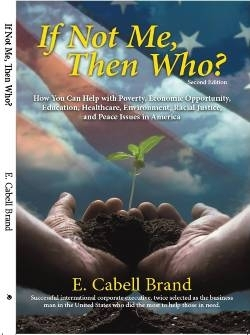If Not Me, Then Who?
How You Can Help with Poverty, Economic Opportunity, Education, Healthcare, Environment, Racial Justice, and Peace Issues in America
- 2010 INDIES Finalist
- Finalist, Social Sciences (Adult Nonfiction)
Superlatives seem so ubiquitous, over the top and meaningless of late that they’ve lost much of their power to impress and engage. So, when a book of exceptional quality comes along, as is the case with If Not Me, Then Who?, to describe it as well written, well organized, persuasive, and inspiring may actually do the book a disservice. But the accolades cannot be avoided. This is the ideal textbook for high school and college teachers (in a multitude of disciplines) to get their students both excited and active in public service.
In the late 1940’s, Brand made the decision to devote one work day a week to alleviating social ills after serving in World War II and the US Foreign Service during the Marshall Plan years. He believed that volunteering twenty percent of his time to implement positive changes at home and abroad was his privilege and duty as a world citizen.
For the next forty years he stuck to his commitment and the results have been nothing less than breathtaking. The dossier of awards and honors he has acquired over the years from former US presidents and other world movers is mind-boggling. The organizations, foundations, school programs and fellowships he started, helped start, consulted with, or served as a boardmember stagger the imagination. And, most importantly, the people whose lives are positively changed by Brand number in the millions. Further, he was not content to stick with only one or two venues where he could be of service, such as helping disadvantaged children or fighting racism. Rather, he chose to confront all of the world’s pressing problems with an entrepreneurial passion to find workable solutions. From lobbying to end the wars in Iraq and Afghanistan, to reversing global warming, to actively supporting a single payer health plan in the US, to starting university departments to train college students to help him get it all done, he’s accomplished it.
Now in his eighth decade, Cabell is no less enthusiastic and indefatigable about fixing the planet. “Good things don’t just happen by accident,” Brand writes. “They happen because concerned, dedicated and inventive people decide to make their own lives and those of their fellow citizens better by coming together to make good things happen.” It may just be that simple.
Reviewed by
Patty Sutherland
Disclosure: This article is not an endorsement, but a review. The publisher of this book provided free copies of the book and paid a small fee to have their book reviewed by a professional reviewer. Foreword Reviews and Clarion Reviews make no guarantee that the publisher will receive a positive review. Foreword Magazine, Inc. is disclosing this in accordance with the Federal Trade Commission’s 16 CFR, Part 255.

